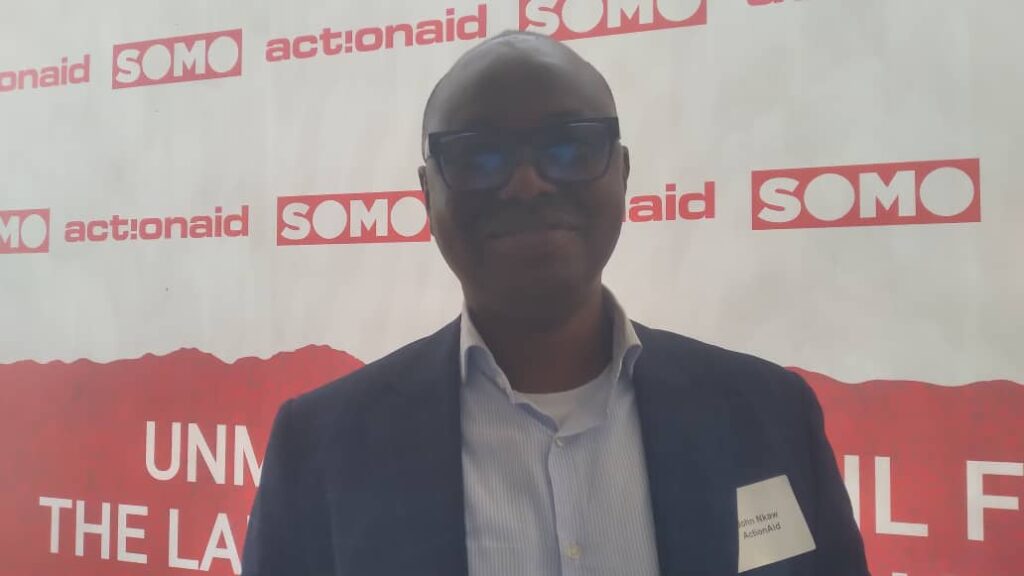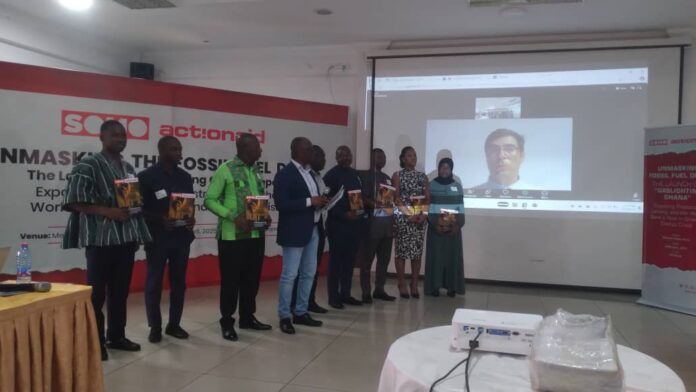A new report by ActionAid and the Centre for Research on Multinational Corporations (SOMO) has called on the World Bank to take responsibility for the challenges facing Ghana’s fossil-fuel-based power sector.
The report highlights how foreign influence—particularly the World Bank’s investments and policy advice—has failed to deliver value for Ghana and contributed to long-term energy and financial burdens.
Speaking at the launch, Luis Scungio, a Senior Researcher at SOMO and lead author of the Gaslighting Ghana report, stated that the World Bank has consistently shaped an investment environment that prioritizes returns for foreign investors, especially international oil companies, while shifting risks onto Ghana.
According to the report, these actions have driven the country into deeper debt, increased the cost of power, and locked Ghana into polluting energy sources. One key example cited is the take-or-pay gas deal, which obligates Ghana to pay approximately US$600 million annually for pre-agreed gas volumes regardless of usage.
The report noted that this arrangement hindered the timely use of Jubilee and TEN foundation gas, as World Bank pressure favored prioritizing the paid-for Sankofa gas which led to monthly payments of US$50 million from mid-2018, despite Ghana only utilizing one-third of the gas.
It resulted in Ghana continuing to pay for unused two-thirds of the gas, with hopes of recouping the costs by 2025.
Additionally, the report also raised glaring issues regarding Ghana’s mounting financial woes in the upstream sector. It notes that between 2017 to 2021 leading up to the 2022 IMF bailout, the bank’s advise resulted in unfair risks-sharing agreement by the country with investors in the upstream and midstream power production.
The Gaslighting Ghana report captured that government of Ghana spent US$350m to procure liquid fuel for power production even though the West Africa Gas Pipeline and Jubilee and TEN fields were supplying gas to the country and at the same time, the country lost US$402m as a result of the attempted cancellation of several Power Purchase Agreements (PPAs).
The report urged an independent audit of Ghana’s fossil fuel-related debt which continues to strain national finances, including direct debts such as the EU loan for WAGP, the CDB loan for gas processing, and Sankofa-related borrowings, as well as indirect costs like payments to IPPs for unused power, overpriced electricity, and expensive fuel purchases driven by project delays and supply shortfalls.
According to the report, the World Bank’s $ 75 million plus an additional $ 50 million risk guarantee roles in Ghana’s deal with the West African Gas Pipeline led by Chevron and Shell resulted in significant debt burdens for the country due to the almost three years delayed execution of the deal.
Additionally, the report mentioned the World Bank’s lead role in the upstream Jubilee, TEN and Sonkofa projects,
It further acknowledged that, stakeholders in Ghana’s public sector have made questionable choices, whiles state power companies have lacked planning and coordination capacity over the past two decades which have cumulatively contributed to the myriad of challenges of the country’s energy sector.
Policy lead, Climate Change and Energy Transition at the African Centre for Energy Policy (ACEP), Dr Charles Gyamfi Ofori in a presentation on the state of Ghana’s energy sector noted that the introduction of the price waterfall mechanism to address the indebtedness in the energy value chain was a laudable idea.
He noted however that the mechanism failed to deliver its objective because there was less money for distribution along the value-chain whiles the compliance level of the distributor, the Electricity Company of Ghana (ECG) was also unconscionable.
To ensure that Ghana’s energy sector becomes relevant and responsive to industry, ACEP recommends improve investment attraction in the oil and gas upstream sector whiles guaranteeing a clear and stable regulatory framework.
It also recommends the need for Ghana to align long term gas decisions with optimizing domestic supply, ensure periodic accounting and reporting by ECG and integrate long term private sector investment in ECG.

The Country Director of ActionAid, John Nkaw said low analysis of contracts in the energy sector contributed to the energy sector debts, power purchase agreements, take or pay agreements.
He further called for a review of the agreements by government itself, arguing that there is the need to look at energy governance in terms of contracts, its sustainability and reduction of cost of energy in the country.
The Actionaid Country Director proposed investment into renewable energy whiles diversifying investment to health, education, agriculture and other critical sectors of the economy.
Mr Nkaw hinted of his outfit’s commitment to a continuous advocacy for good governance in Ghana’s natural resource sector to derive maximum benefits to the citizenry.



